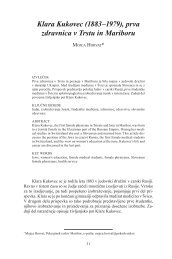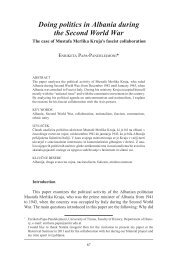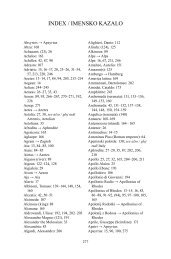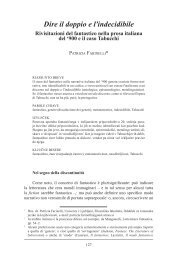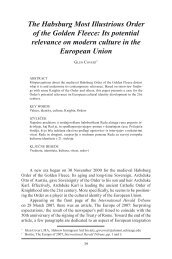The Invention of Modern Aesthetics: From Leibniz to Kant
The Invention of Modern Aesthetics: From Leibniz to Kant
The Invention of Modern Aesthetics: From Leibniz to Kant
You also want an ePaper? Increase the reach of your titles
YUMPU automatically turns print PDFs into web optimized ePapers that Google loves.
<strong>The</strong> <strong>Invention</strong> <strong>of</strong> <strong>Modern</strong> <strong>Aesthetics</strong>: <strong>From</strong> <strong>Leibniz</strong> <strong>to</strong> <strong>Kant</strong><br />
knowledge (in <strong>Leibniz</strong>’s sense <strong>of</strong> adequate and intuitive) <strong>of</strong> works <strong>of</strong><br />
art as perceptible objects. Nevertheless <strong>Leibniz</strong> does think that art and<br />
judgments <strong>of</strong> taste play an important and ineliminable role in human<br />
life, in his review <strong>of</strong> Shaftesbury’s inluential treatise Characteristics<br />
<strong>of</strong> Men, Manners, Opinions, Times (1711) <strong>Leibniz</strong> remarks that »[t]aste<br />
as distinguished from understanding consists <strong>of</strong> confused perceptions<br />
for which one cannot give an adequate reason«, taste is akin <strong>to</strong> »an<br />
instinct« that is formed by »nature and habit«. 39 <strong>Leibniz</strong> shares Shaftesbury’s<br />
criticisms <strong>of</strong> those »who seek demonstrations everywhere,<br />
and are incapable <strong>of</strong> seeing anything in everyday light«, they are<br />
like »people who are called moon-blind because they can see only by<br />
moonlight«. 40 <strong>The</strong>re is thus, in <strong>Leibniz</strong>’s opinion more <strong>to</strong> knowledge<br />
than has been dreamt <strong>of</strong> in rationalist philosophy. <strong>The</strong> kind <strong>of</strong> knowledge<br />
afforded by sensuous experience and which relies on »assessment<br />
by feeling« has, as Barnouw remarks, been little studied because <strong>of</strong> the<br />
reason-blindness <strong>of</strong> so many prominent thinkers. 41<br />
One more aspect <strong>of</strong> <strong>Leibniz</strong>’s thinking is worth mentioning<br />
here, his contention that there is a multitude <strong>of</strong> petites perceptions in<br />
every sensuous experience. Every sensation is a composite <strong>of</strong> small<br />
imperceptible sensations constituting an assemblage confus, grasped<br />
by consciousness. <strong>Leibniz</strong> says that »at every moment there is in us<br />
an ininity <strong>of</strong> perceptions, unaccompanied by awareness or relection«,<br />
this is so, he argues, because »these impressions are either <strong>to</strong>o<br />
minute or <strong>to</strong>o numerous, or else <strong>to</strong>o unvarying, so that they are not<br />
suficiently distinctive on their own«. 42 <strong>The</strong>ir effects, or, rather, the<br />
conjoined effect <strong>of</strong> these minute perceptions, is, however, perceptible.<br />
<strong>Leibniz</strong> <strong>of</strong>fers the roaring <strong>of</strong> the sea as an example <strong>of</strong> a perception<br />
which consists <strong>of</strong> numerous minute imperceptible perceptions,<br />
although »we must hear the parts which make up this whole, that is<br />
the noise <strong>of</strong> each wave, although each <strong>of</strong> these little noises makes<br />
itself known only when combined confusedly with all the others«. 43<br />
<strong>The</strong>se minute perceptions are fused <strong>to</strong>gether in<strong>to</strong> a perceptible whole.<br />
»<strong>The</strong>se minute perceptions«, says <strong>Leibniz</strong>, »constitute that je ne sais<br />
quoi, those lavours, those images <strong>of</strong> sensible qualities, vivid in the<br />
39<br />
G. W. <strong>Leibniz</strong>, »Remarks on the Three Volumes Entitled Characteristics <strong>of</strong> Men,<br />
Manners, Opinions, Times, … 1711«, 1712, in G. W. <strong>Leibniz</strong>, Philosophical Papers<br />
and Letters, p. 634.<br />
40<br />
Ibid.<br />
41<br />
Barnow, »<strong>The</strong> Beginnings <strong>of</strong> ‘<strong>Aesthetics</strong>’ and the <strong>Leibniz</strong>ian Conception <strong>of</strong> Sensation«,<br />
p. 95. Barnouw mentions Gracián, Pascal, Bouhours, <strong>Leibniz</strong> and Baumgarten<br />
among seventeenth and eighteenth century thinkers as exceptions <strong>to</strong> the<br />
prevalent » reason-blindness« <strong>of</strong> the age.<br />
42<br />
<strong>Leibniz</strong>, New Essays on Human Understanding, p. 53.<br />
43<br />
Ibid., p. 54.<br />
143




